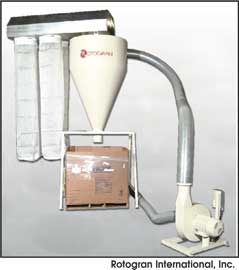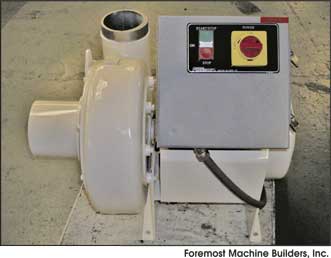by MARY M. COX
Manufacturer List
|
The use of a blower evacuation system is part of the size reduction process often involved in recycling applications. Some systems can be configured to separate paper from plastic, for example, separating labels from plastic bottles.
Mike Cyr is the owner of Rotogran International. The company has been involved in these processes since 1982. Rotogran manufactures blower/cyclone systems for evacuating granulators, which they also manufacture, along with fines separator systems and all auxiliary components used in the size reduction process.

Cyr noted, “A blower moves material and the cyclone stops it. Blowers and cyclones will not work unless the material involved is relatively dry and the use of these two components eliminates the need for using auger screws or mechanical conveyors to remove material from the granulator which is also involved in these processes.
“This evacuation process is beneficial because as the blower draws air through the granulator, along with little pieces of plastic as well, production increases. Without the evacuation system, material otherwise caught by the granulator would slow down the overall process. Also, as air passes through the granulator, the air cools the equipment and so less fine dust is generated, resulting in a higher quality end product.”
The most common process used is the pass-through evacuation system. The material involved passes through the blower and is thrown to the cyclone. Alternatively, the negative pressure evacuation system can be used. This process keeps the material/regrind from passing through the blower. This process is also more expensive, however, due to the need for rotary air locks – a valve that locks the air into the equipment space involved.
Foremost Machine Builders has a complete line of direct drive impellers and blowers designed to provide rapid, automatic unloading of all plastic raw materials in pellet or granular (regrind) form. Drew Schmid, assistant sales manager, explained, “The direct drive designs operate at lower RPMs than belt drive units, resulting in considerably lower sound levels. Yet conveying rates are equal to or better than comparably horse powered, belt driven machines. The simplified design requires much less routine maintenance and, with fewer components, assures trouble free operation and long life.”
Schmid said the units can be supplied with material pick up suction lances. “They are ideal for emptying bulk cartons and drums, feeding storage bins, loading machine hoppers and other in-plant conveying applications. They’re also quite portable and designed for continuous operation. In other applications, and with all other units, a chute or similar device is required to direct material into the inlet of the blower or impeller. They are commonly used to unload grinders, granulators, blenders and material storage tanks. Under normal circumstances, a cyclonic air separator is required at the material receiving location,” noted Schmid.
The employees at Foremost have been building blowers for the plastics industry since the 1960s and the firm offers three different types of direct drive blowers.
The DI series of impellers is available in 1 and 2 h.p. options and are used in applications involving low cubic feet per minute (CFM) which is under 250 and small conveying lines which are no more than 3”. The DB series of blowers are available in 2, 5 and 10 h.p. types and are used in applications involving higher CFM of up to 1,730 and larger conveying lines of up to 6”. The HVB series of high volume blowers are available in 7.5, 10 and 15 horsepower options and are used in applications involving very high CFM and larger conveying lines of up to 8”. These blowers are built of heavy walled steel with a replaceable wear wrap and are ideal for post-consumer recycling applications.

Kice Industries has manufactured “skilled air” equipment for a wide variety of process industries for 70 years. “At our recently expanded 150,000 sq.ft., state of the art manufacturing facility, we produce high quality process equipment that can be tailored exactly to each individual customer’s needs,” stated Andy Forrester, sales director.
Kice manufactures a broad range of heavy duty fans, filters, cyclones and valves which are widely utilized in the recycling industry for both material handling and dust control applications.
Their fans and blowers are available in a wide variety of sizes and configurations to suit the specific air pressure and volume requirements of each system they design.
The other critical equipment in their systems, such as cyclones, filters, valves and ductwork can be manufactured in a variety of metals including carbon steel, stainless steel and aluminum or they can be coated with specialty abrasive resistant materials appropriate for the specific characteristics of the product being handled.
In addition to these products, Kice also produces a unique, multi aspirator system. “The system can add tremendous value to a variety of processes. The product performs challenging material separation, based on both particle size and density. By pulling an air current across the flow of a product stream, and through the use of a Kice fan, cyclone and multi aspirator, it is possible to lift and remove unwanted material from good product, leaving it cleaner for further processing or helping to minimize waste due to contamination.
“Kice equipment is known for quality whether you need products for recycling plastics, paper, tires, carpet, asphalt shingles or any other material. Our application knowledge is extensive and we enjoying assisting clients in optimizing their processes. As well as our comprehensive manufacturing capabilities, Kice services include complete system design, installation, automation and controls.
“We can help you take your concept all the way to a safe, reliable and efficient solution, regardless of your system flow rate requirements. If you need to remove fine particles or different types of material from your product stream in order to minimize waste or improve product quality, Kice will likely have the solution you need,” Forrester stated.
Published in the February 2016 Edition of American Recycler News









